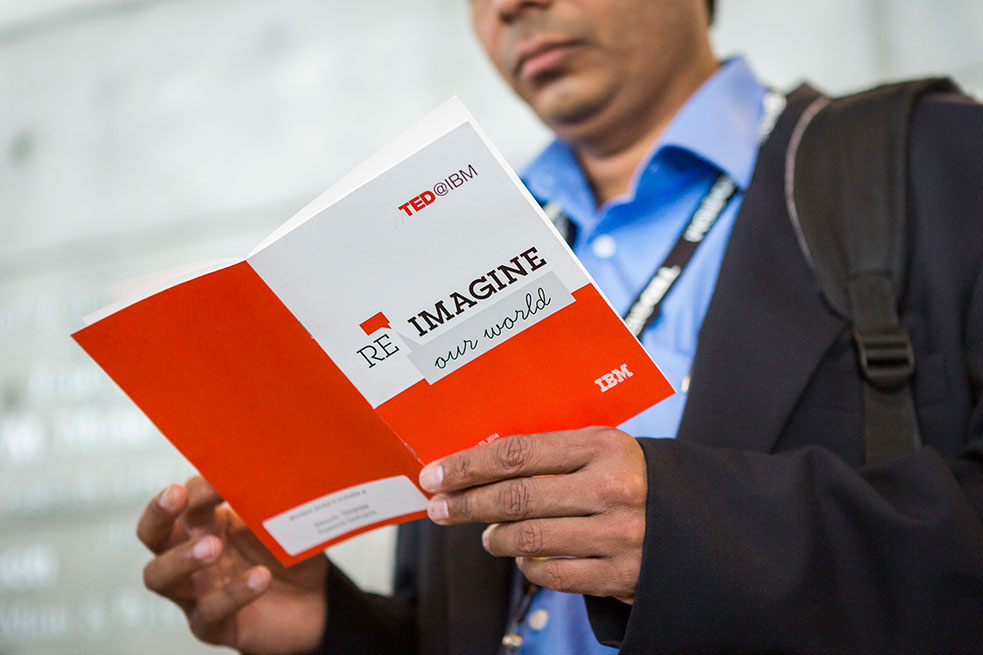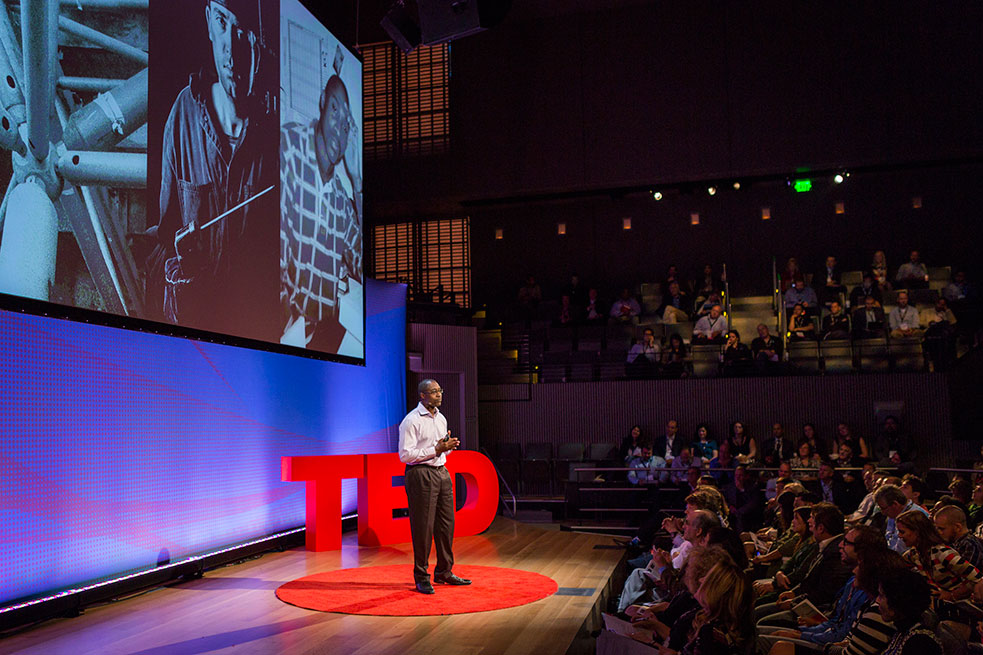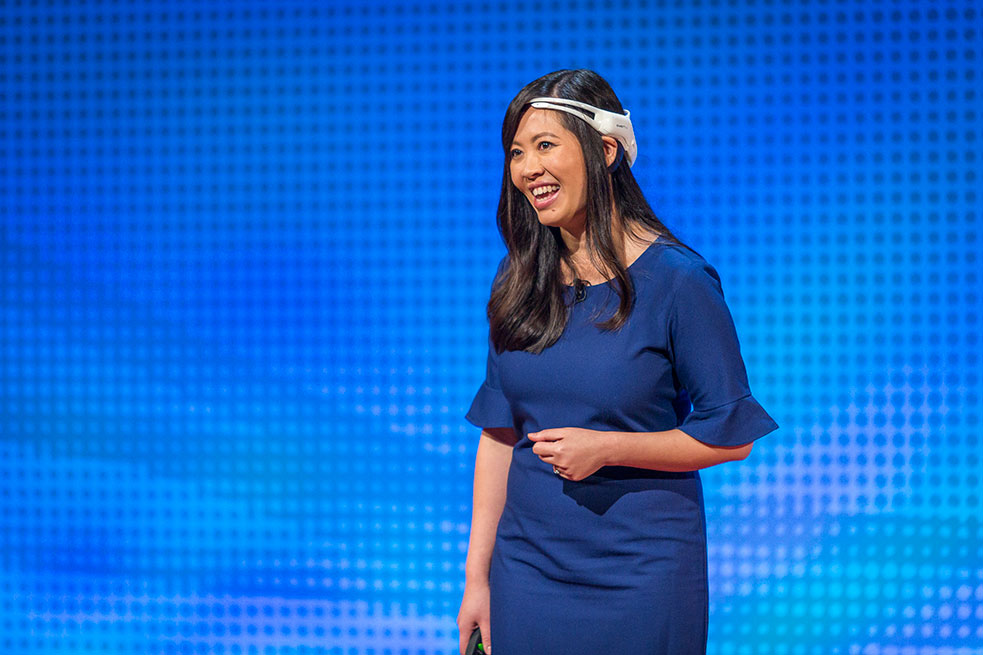
The program guide for TED@IBM, themed “Reimagine our world.” Photo: Marla Aufmuth/TED
By Laura McClure, Emily McManus and Kate Torgovnick May
Big data is already transforming our daily lives. And at TED@IBM, a TED Institute event, we got a glimpse of what’s next. Speakers revealed how data will change spaces from the kitchen to the emergency room, and how it will even help us react more quickly to the next ebola-scale epidemic. Throughout the day echoed the message that, for the technologists creating this new future, it is both a tremendous opportunity as well as a big responsibility.
Below, some choice words from each of the TED@IBM talks:
“There is no business-to-business, there’s no business-to-consumer, there is only human-to-human. You don’t sell to a brand, you sell to a person. People identify with human experience, with human conversation.”
—Bryan Kramer, CEO of Pure Matter, who spoke on the importance of sharing. He asked viewers to tweet their own idea using the hashtag #SharingInspires, and it trended on Twitter.
“Today in the ICU, medical teams are bombarded with data and noise. Nearly 150 million data points and over 1,300 alarms are generated per day by one patient … and 90% of those alarms are completely inactionable.”
—Inhi Cho Suh, Vice President of Big Data Integration and Governance for IBM Software Group, who spoke on how data can lead to better healthcare
“Imagine a world where, no matter how far you live from an electricity grid or a pump station, you will have access to clean power, heating, refrigeration, drinkable water and even gasoline. Now, imagine that this technology can do it using everyday materials like concrete, reflective aluminum foil and air — plus the ultra-high-efficiency solar cells used in satellites.”
—Gianluca Ambrosetti, Head of Research for Airlight Energy, which seeks to bring solar energy to remote parts of the planet using sunflower-shaped panels.
“An algorithm spotted the ebola outbreak nine days before the Word Health Organization recognized it. We could have put simple measures in effect to contain that disease early on.. With the flood of big data and our capacity to make sense of it , we can now forecast the next humanitarian healthcare crisis.”
—Monika Blaumueller, consultant at IBM, who spoke on how data can super-size humanitarian aid
“Why does tone matter? Tone reflects our intent, our frame of mind and our emotion. Tone is instinctive, but setting the right tone takes work … Tone can inspire and guide, or disrupt and hurt.”
—Kareem Yusuf, of IBM’s Smarter Commerce initiative, who spoke about how businesses must think carefully about the tone they set with customers in the digital landscape
“A growing number of Americans work, play and live with people who think exactly like them — but ‘opportunity makers’ actively seek friendships and experiences with those who are different from them. Some of our most valuable allies are people who don’t act or think at all like us. ”
—Kare Anderson, columnist for Forbes, who spoke on the three traits that opportunity makers have in common
“We often hear that movies are dead or dying. I don’t believe the cinema is dying, but I do believe it’s wounded from a million paper cuts. There are two things that a cinema has that you never get at home. One, a screen the size of Cleveland. Two, the magic of the room watching it, where there sits a dream shared with a one-time-only mix of strangers, a gold mine of emotions waiting to collide in the dark. People come to movies ready to dream, and that’s a resource that’s too precious to squander.”
—Brad Bird, Academy Award-winning director, who spoke on how filmmakers can keep capturing that magic

Kareem Yusuf shared the story of how he was able to bridge two very different working environments by striking the right tone. Photo: Marla Aufmuth/TED
“When my oldest daughter was three, she had to have tubes in her ears. The surgeon at the hospital told us they scheduled those operations on Tuesdays and Thursdays, on the same days of some of the most difficult adult procedures. Following those surgeries, the kids recover in a large and common recovery room – alongside the adults. Why? Because the adults recover faster when exposed to small children who are also recovering.”
—Erick Brethenoux, of IBM’s Business Analytics Division, who spoke on what we can learn from emotional analytics
“With each generation, we don’t just pass along our DNA—we pass along our ideas. The innovations we uncover today become the building blocks for innovation for future generations.”
—Lisa Seacat DeLuca, mobile software engineer for IBM’s Open Technology and Cloud Performance organization, who spoke on the “Internet of Everything”
“We’re bombarded with stories about how much data there is in the world. But much of our data doesn’t fit neatly into databases. It is highly subjective … Data doesn’t create meaning. We do. And we have to ask, ‘Did the data really show us this? Or does the conclusion make us feel more comfortable and successful?’”
—Susan Etlinger, industry analyst with Altimeter Group, who spoke on the incredible responsibility that comes with interpreting data
“Can computers help us create dishes that are healthy, taste good, and have never been seen before?”
—Florian Pinel, Senior Software Engineer in the IBM Watson Group, who spoke about the potential of Chef Watson
“At some point, parents have to trust their teenagers. People who successfully parent teens into adulthood eventually tell them, ‘I know you can do this on your own.’ It’s time for us to learn how do this at work as well … Leaders today need to trust that their employees have the information, experience and good judgment to make decisions that in the past would have been sent ‘up the ladder.’”
—Charlene Li, CEO of the Altimeter Group, who spoke about the topic of her bestselling-book, Open Leadership
“As more and more of our lives are captured in digital, the insights that can be generated by big data analytics will become increasingly impactful. As a society we can choose to let these insights be used as a force for good or evil; to exploit individuals or enrich their lives. Our approach to privacy will have the single greatest impact on that outcome.”
—Marie Wallace, Analytics Strategist for IBM and creator of the blog All Things Analytics, who spoke on the importance of privacy
“For the most part, we only study brains when there is something wrong with them … This technology allows us to study brains in conditions and contexts that are as diverse as those of everyday life.”
—Tan Le, CEO of EMOTIV, who spoke about how her company’s headsets are advancing the understanding of the human brain

Tan Le wore a headset on stage that allowed attendees to look at her brain activity, live. Photo: Marla Aufmuth/TED
Comments (9)